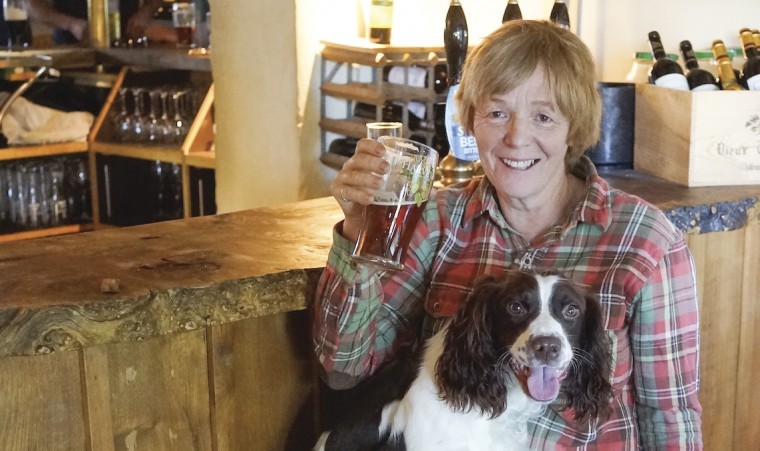My youngest daughter tells me that scrambling over rocks, jumping off cliffs and swimming around the Pembrokeshire coast is more fun than farming; I’m not convinced myself. I must work on my persuasive skills; we didn’t gain extra labour but ended up looking after her dog. Apparently terriers are no good at coast-steering. This one isn’t particularly good at ratting either.
Daughter returned from holiday bearing a gift in the form of a bar of soap enclosed in felted wool. The labelling extolled its virtues, reading “No flannels. No mess. Just gentle exfoliation. Felted soap lasts longer than normal soap and the 100% wool casing not only acts as a lather enhancer but shrinks with use, keeping the soap attractive right to the end”. I can vouch that it lasts longer; we’ve been using it since August. It’s changed shape but not size. I reckon it could win a longevity award. It was suggested that this would be a novel way of using wool, but I doubt we’ll be converting our wool clip to exfoliators anytime soon.
If you haven’t already done so, please consider signing the online petition, British Wool for British Insulation and Carpeting. More signatures are needed. Wool is such a great product, it deserves more recognition and better returns for producers.
Speaking of British products, the update about The Pevensey Cheese Company is that two-and-a-half years after its inception, the first batch of cheese has been despatched, invoiced and is on sale in cheesemongers, deli’s and restaurants across the UK. It’s taken a lot of hard work, trials and tribulations but Hazel (middle daughter) and Martin are pleased to announce that Pevensey Blue is now available to buy. Farm-gate purchases can be arranged via Instagram @pevenseycheese.
Martin has relentlessly pursued his dream to make cheese. Taking a leap of faith in May 2018 he left his job with Neal’s Yard Dairy selling cheese in Borough Market. He then took a part time job in Somerset learning the craft of making cheese, Caerphilly and pitchfork cheddar. Meanwhile he researched how to go about designing functional cheese making facilities. Hazel and Martin applied for, and secured, planning permission and Leader grant funding to create the cheese rooms on our farm. Kitchen table talk revolved around plotting suitable layouts, storage space and packing room requirements.
Court Lodge Farm, in the same parish as us, agreed to supply organic milk for this venture. Hazel and Martin then had to evolve a recipe with the aim of creating a soft blue cheese. In June 2018, with milk collected in a churn, their first trial batch of cheese was made in our granny annex. Weekends were spent experimenting, and cheeses at various stages of maturity (and quality) started to appear in our fridge. A designated cheese fridge was purchased.
The cheese rooms were built and equipment installed, and in October 2019 the first larger batches of cheese were made in the new premises. Our farmhouse became less dominated by cheese, and happily there’s now room to chill alcohol again. Martin gave up his job in the West Country to concentrate on progressing the Pevensey Cheese Company. The environmental health officer expressed concern about the proximity of the cheese rooms to our working farm, so we put in concrete panels to divide it off. Finally an EC mark and number was obtained. After much tasting, fine-tuning and consultations, they’ve nailed it. Don’t take my word for it, though – give it a try.
I’ve been impressed by how embracing and encouraging the cheese community has been towards newcomers. I’d like to think that farmers are similarly supportive to new entrants. Farming is not the easiest route to choose, but it does have its rewards and established farmers should be prepared to help the youngsters. Newbies bring different approaches which can be refreshing. Passing on skills can be fun and I hope I never consider myself too old to learn or become too contrary to share. Contributing in some way to the success of others can be a good vibe.
The clocks have changed and it’s raining. Autumn calving has started. I feel sympathy for the calves that are experiencing a rather soggy start to life; it’s miserable but not cold yet and they appear happy so long as they’ve had their fill of colostrum. Our rams are getting frisky and annoyingly have taken to scrapping. We’ve had to remove one who sustained a nasty wound to his head. They haven’t got long to wait before they can get to work. I’ve gone through my ewes and tried to cull hard. I find this easier said than done, but numbers have been reduced with no replacements for the second year running.
Corn is in the ground; grass seed is growing. We managed to snatch one last crop of silage. It won’t win any prizes for nutritional content, but it’ll help to bolster our winter supplies. The rivers are filling up and we’ve more grass now than we’ve had for a long time. We’re getting the sheds ready to house cattle, but won’t rush to get them in. Our annual TB test is booked. Some hedges have been cut but there’s still more to do.
Nigel and I enjoyed a visit to check out our prospective Christmas dinner at Meadow Brook Farm, which produces quality free range traditional turkeys (www.sheffieldfarms.co.uk). When Nigel got his camera out, he was quickly surrounded by some incredibly vain and inquisitive birds. I’d forgotten how nosy and noisy turkeys can be. It’s good to appreciate the preparation and hard work that goes into producing happy, healthy birds that ultimately taste delicious on Christmas Day.
‘Prepare early for Christmas’, was the advice on the news today. I’m a last-minute person myself; other half commented: “We’d better get some booze in, then.” Well, I’m not going to argue with that, but I’m not entirely sure that’s what the newscaster meant.




